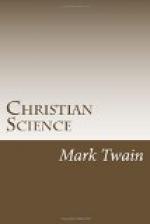I note this phrase:
“Christian Science eschews divine rights in human beings.”
“Rights” is vague; I do not know what it means there. Mrs. Eddy is not well acquainted with the English language, and she is seldom able to say in it what she is trying to say. She has no ear for the exact word, and does not often get it. “Rights.” Does it mean “honors?” “attributes?”
“Eschews.” This is another umbrella where there should be a torch; it does not illumine the sentence, it only deepens the shadows. Does she mean “denies?” “refuses?” “forbids?” or something in that line? Does she mean:
“Christian Science denies divine honors to human beings?” Or:
“Christian Science refuses to recognize divine attributes in human beings?” Or:
“Christian Science forbids the worship of human beings?”
The bulk of the succeeding sentence is to me a tunnel, but, when I emerge at this end of it, I seem to come into daylight. Then I seem to understand both sentences—with this result:
“Christian Science recognizes but one God, forbids the worship of human beings, and refuses to recognize the possession of divine attributes by any member of the race.”
I am subject to correction, but I think that that is about what Mrs. Eddy was intending to convey. Has her English—which is always difficult to me—beguiled me into misunderstanding the following remark, which she makes (calling herself “we,” after an old regal fashion of hers) in her preface to her Miscellaneous Writings?
“While we entertain decided views as to the best method for elevating the race physically, morally, and spiritually, and shall express these views as duty demands, we shall claim no especial gift from our divine organ, no supernatural power.”
Was she meaning to say:
“Although I am of divine origin and gifted with supernatural power, I shall not draw upon these resources in determining the best method of elevating the race?”
If she had left out the word “our,” she might then seem to say:
“I claim no especial or unusual degree of divine origin—”
Which is awkward—most awkward; for one either has a divine origin or hasn’t; shares in it, degrees of it, are surely impossible. The idea of crossed breeds in cattle is a thing we can entertain, for we are used to it, and it is possible; but the idea of a divine mongrel is unthinkable.
Well, then, what does she mean? I am sure I do not know, for certain. It is the word “our” that makes all the trouble. With the “our” in, she is plainly saying “my divine origin.” The word “from” seems to be intended to mean “on account of.” It has to mean that or nothing, if “our” is allowed to stay. The clause then says:
“I shall claim no especial gift on account of my divine origin.”
And I think that the full sentence was intended to mean what I have already suggested:




